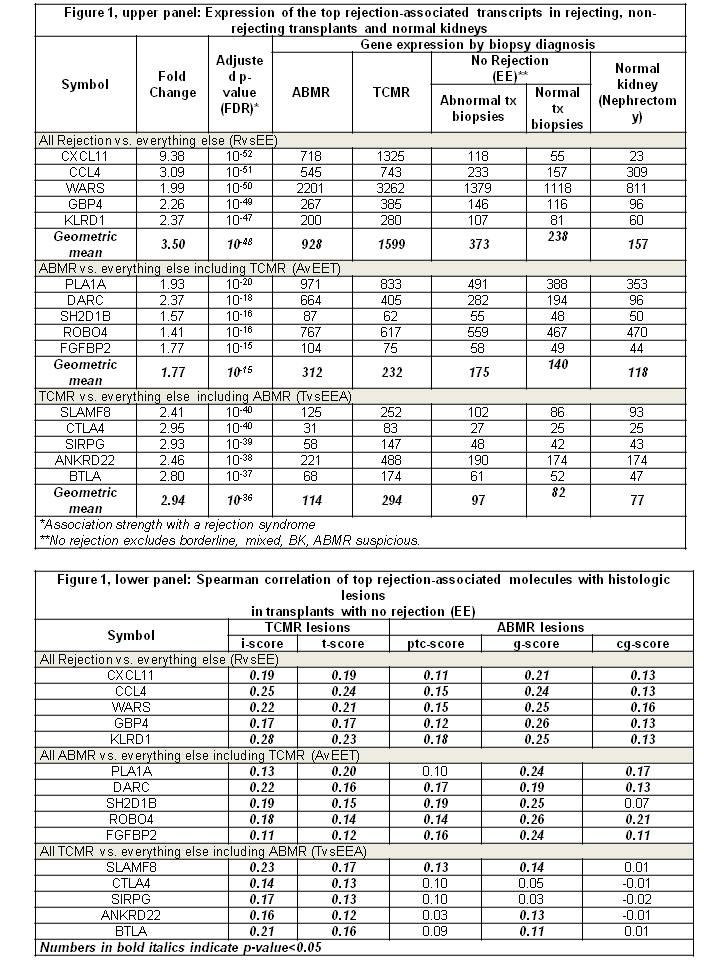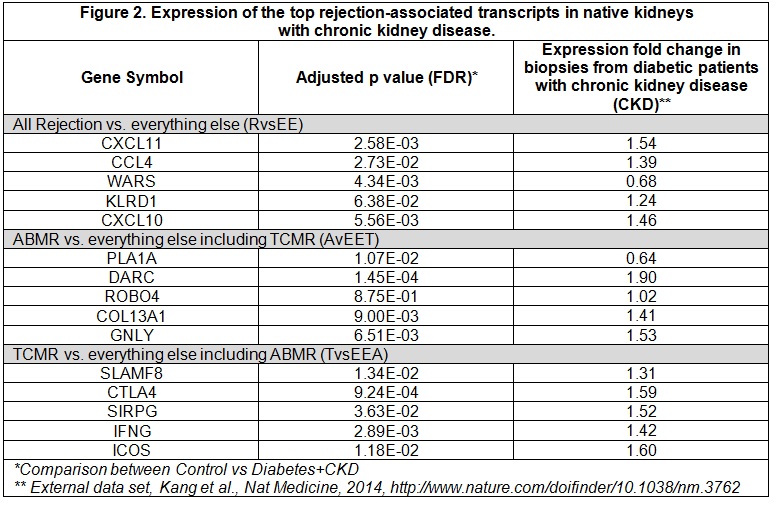Transcript Changes Associated with Graft Rejection Are Not Specific for Rejection Because They Are Shared with Tissue Responses to Wounding.
University of Alberta, Edmonton, Canada
Meeting: 2017 American Transplant Congress
Abstract number: B84
Keywords: Gene expression, Kidney transplantation, Rejection
Session Information
Session Name: Poster Session B: Antibody Mediated Rejection in Kidney Transplant Recipients II
Session Type: Poster Session
Date: Sunday, April 30, 2017
Session Time: 6:00pm-7:00pm
 Presentation Time: 6:00pm-7:00pm
Presentation Time: 6:00pm-7:00pm
Location: Hall D1
The diagnosis of rejection by histology is based on the presence of relatively non-specific lesions. This is because the histology lesions are actually non-specific, but become relative specific when meeting certain histology rules. Currently, the possibility of making a molecular diagnosis of T cell mediated or antibody-mediated rejection (TCMR, ABMR) emerged. This requires that genes associated with TCMR or ABMR are not expressed in normal tissue and not induced by other injuries and diseases. We studied molecules highly associated with TCMR or with ABMR or with all Rejection in 703 indication biopsies to see if they were truly selective for rejection vs. non-specific tissue injury and diseases.
Virtually all top Rejection, ABMR, and TCMR associated transcripts were increased in transplants without rejection, particularly in abnormal biopsies e.g. IFTA, recurrent disease (Figure 1 upper panel).  The top TCMR transcripts were perhaps most selective, but note that the top TCMR transcripts were actually highly increased in ABMR and abnormal transplants without rejection, compared to normal kidney tissue. Also the top molecules often showed weak (but statistically significant) correlations with the rejection lesions in biopsies diagnosed as no rejection (Figure 1, lower panel).
The top TCMR transcripts were perhaps most selective, but note that the top TCMR transcripts were actually highly increased in ABMR and abnormal transplants without rejection, compared to normal kidney tissue. Also the top molecules often showed weak (but statistically significant) correlations with the rejection lesions in biopsies diagnosed as no rejection (Figure 1, lower panel).
Moreover, we found the elevated expression of many of our top transcripts in native kidney diseases with inflammation.  Thus transcripts highly associated with TCMR, ABMR, or Rejection are not completely selective for rejection, and are often increased at a low level even in the most normal kidney transplants or native kidneys because rejection mechanisms share molecules with innate immunity and with tissue responses to wounding. Thus the use of simple gene sets means with a cut-off cannot make specific diagnoses accurately.
Thus transcripts highly associated with TCMR, ABMR, or Rejection are not completely selective for rejection, and are often increased at a low level even in the most normal kidney transplants or native kidneys because rejection mechanisms share molecules with innate immunity and with tissue responses to wounding. Thus the use of simple gene sets means with a cut-off cannot make specific diagnoses accurately.
CITATION INFORMATION: Halloran P, Famulski K, INTERCOMEX Study Group Transcript Changes Associated with Graft Rejection Are Not Specific for Rejection Because They Are Shared with Tissue Responses to Wounding. Am J Transplant. 2017;17 (suppl 3).
To cite this abstract in AMA style:
Halloran P, Famulski K, Group INTERCOMEXStudy. Transcript Changes Associated with Graft Rejection Are Not Specific for Rejection Because They Are Shared with Tissue Responses to Wounding. [abstract]. Am J Transplant. 2017; 17 (suppl 3). https://atcmeetingabstracts.com/abstract/transcript-changes-associated-with-graft-rejection-are-not-specific-for-rejection-because-they-are-shared-with-tissue-responses-to-wounding/. Accessed March 3, 2026.« Back to 2017 American Transplant Congress
